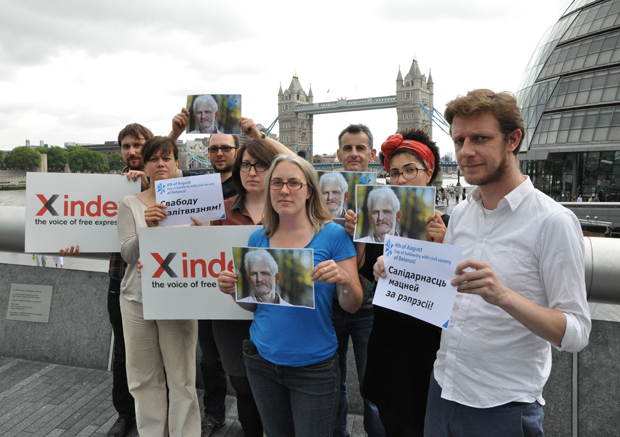International Day of Solidarity with Civil Society is celebrated today in Belarus

The date is timed to the anniversary of Ales Bialiatski’s detention. The world-known human rights defender was arrested on August 4, 2011.
It is already the second year when the International Day of Solidarity with Belarusan civil society gets involved non-governmental organizations all over the world in the International Day of Solidarity with Belarusan civil society. The aim of the event is to show solidarity with the civil society in Belarus and moral support to human rights defenders and civil society activists who continue to work in the country. "We will celebrate this day every year, until the situation of the civil society in Belarus changes so that people won't be imprisoned for their human rights activities and the fundamental freedoms: freedom of expression, of assembly and of associations will be respected," cites HRC “Viasna” the Manifesto of the Day of Solidarity.
This year the organizers, namely the International Committee of the Control over the human rights situation in Belarus, the Center for Civil Liberties (Ukraine), the Helsinki Foundation for Human Rights (Poland), Moscow Helsinki Group (Russia), International Youth Human Rights Movement, "Index on Censorship" (Great Britain ) and Belarusan Human Rights House (Lithuania), offer people around the world to send postcards and letters with words of support to Belarusan political prisoners, human rights defenders and activists and publish materials and hold informational actions concerning the situation in Belarus. This year such actions will take place in the United States, Great Britain, Poland, Sweden, Germany, Lithuania, Russia, Ukraine, Kazakhstan and Kyrgyzstan, and some other countries.
The organizers offer people from different countries to support the Solidarity Day by telling about what is happening in Belarus on 4 August, and about the people who offer an alternative to the present situation – Belarus without the death penalty, no illegal detentions and militarized consciousness, open to the outside world, with a wide space of freedom and solidarity." "We are convinced that the situation in Belarus is a landmark not only for Europe and Central Asia, but also for many other countries, where activists are harassed, and the authorities feel uncontrollable and unpunished," state the organizers of the action.
At the same time, a total of 15 members of the European Parliament issued a joint statement on August 2, urging Belarusan authorities to "release and rehabilitate all political prisoners, immediately and unconditionally, and to establish a moratorium on the use of the death penalty."
As Anna Bialas, an aide to Polish MEP Marek Migalski, told BelaPAN, the statement was issued on the initiative of Mr. Migalski and a Swiss-German human rights watchdog called Libereco – Partnership for Human Rights on the occasion of Solidarity Day. "The latest reports and statements of Belarusan human rights defenders demonstrate that the human rights situation in Belarus continues to deteriorate," the statement says. "At least 12 political prisoners are still being kept in Belarusan prisons.”
The MEPs note that more than 40 Belarusans had their rights and civil liberties restricted as a result of politically motivated trials in the period between 2011 and 2012. Political prisoners who have already been released from correctional institutions have not been rehabilitated and remain under preventive supervision, they stress. The MEPs express concern that Belarus has not yet imposed a moratorium on the use of the death penalty, and that three men have been sentenced to death since April 24, 2013.
The MEPs call on all member countries of the European Union and West European politicians to "decline to cooperate with the regime of Alexander Lukashenko [Aliaksandr Lukashenka] for as long as our human rights demands remain unfulfilled."
The action has wide support. Thus, Index on Censorship also supports Belarusan human rights defenders.
“Today we send our solidarity and support to Belarusan independent journalists and civil society activists, who continue their courageous work to defend human rights in Belarus. The government of Belarus must immediately and unconditionally release all of its political prisoners. Before the EU engages with Belarus, all political prisoners need to be released and concrete steps taken to remove restrictions that curtail freedom of expression”, said Mike Harris, Head of Advocacy at Index.

Miklos Haraszti, the UN Special Rapporteur on the human rights situation in Belarus has urged the Belarusian government to "immediately and unconditionally" release imprisoned rights activist Ales Bialiatski, RFE/RL reports. In a statement issued on August 2 he characterized Bialiatski’s detention as "a symbol of the repression against human rights defenders”.
US State Department has issued a press-release on second anniversary of Ales Bialiatski’s arrest. It states that the US honours “Bialiatski’s work to protect the weak and uphold the highest standards of human rights despite harassment by Belarusian authorities”, as well as reiterates its call “on the Government of Belarus to immediately release Bialiatski and all political prisoners and restore their civil and political rights”.
Let us recall that Ales Bialiatski, a Peace Nobel Prize nominee, the winner of the Department of State’s 2011 Human Rights Defender Award and a leader of Human Rights Centre Viasna, was arrested 4 August 2011, and currently serving a four-and-a-half year prison sentence for alleged tax evasion. The income on which he was found guilty of not paying taxes had in fact been used to support victims of human rights violations in Belarus. Amnesty International has declared him a prisoner of conscience and Western leaders have called for his unconditional release.
-
03.01
-
07.10
-
22.09
-
17.08
-
12.08
-
30.09



























